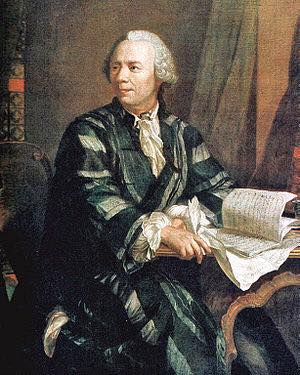
Leonhard Euler Swiss 15 April 1707 – 18 September 1783) was a Swiss mathematician, physicist, astronomer, logician and engineer who made important and influential discoveries in many branches of mathematics like infinitesimal calculus and graph theory while also making pioneering contributions to several branches such as topology and analytic number theory. He also introduced much of the modern mathematical terminology and notation, particularly for mathematical analysis, such as the notion of a mathematical function. He is also known for his work in mechanics, fluid dynamics, optics, astronomy, and music theory.
Euler was one of the most eminent mathematicians of the 18th century, and is held to be one of the greatest in history. He is also widely considered to be the most prolific mathematician of all time. His collected works fill 60 to 80 quarto volumes, more than anybody in the field. He spent most of his adult life in Saint Petersburg, Russia, and in Berlin, then the capital of Prussia.
A statement attributed to Pierre-Simon Laplace expresses Euler's influence on mathematics: "Read Euler, read Euler, he is the master of us all." Wikipedia, Leonard Euler
In the mid-18th century, Swiss polymath Leonhard Euler, one of history’s greatest mathematicians, embarked on an extraordinary correspondence with Princess Friederike Charlotte of Brandenburg-Schwedt, a 15-year-old noblewoman. Between 1760 and 1762, Euler penned 234 letters to the princess, meticulously crafting lessons in mathematics, physics, and philosophy. His goal was to make complex subjects accessible to a young woman with no formal scientific training, reflecting his belief in the universal potential for intellectual growth. Euler’s letters were written in a clear, engaging style, blending rigorous concepts with practical examples, such as using everyday objects to explain physics or simplifying calculus for a beginner. This correspondence, initiated at the request of Friederike’s uncle, Frederick the Great of Prussia, was not merely a private tutorial but a groundbreaking educational endeavor. Euler tailored his explanations to suit the princess’s curiosity and intellect, covering topics from algebra and geometry to Newtonian mechanics and metaphysical questions about the nature of the universe. The impact of Euler’s letters extended far beyond his correspondence with Friederike. Compiled and published in 1768 as 'Letters to a German Princess', the collection became a widely used textbook in female academies across the German-speaking world. Its influence spread to other parts of Europe, offering women access to scientific and philosophical knowledge in an era when such opportunities were scarce.
Ramsay
When Leonhard Euler, the distinguished mathematician of the eighteenth century, wrote his essay on a New Theory of Music, Fuss remarks - "It has no great success, as it contained too much geometry for musicians, and too much music for geometers." There was a reason which Fuss was not seemingly able to observe, namely, that while it had hold of some very precious musical truth it also put forth some error, and error is always a hindrance to true progress. Euler did good service, however. In his letters to a German Princess on his theory of music he showed the true use of the mathematical primes 2, 3, and 5, but debarred the use of 7, saying, "Were we to introduce the number 7, the tones of an octave would be increased." It was wise in the great mathematician to hold his hand from adding other notes. It is always dangerous to offer strange fire on the altar. He very clearly set forth that while 2 has an unlimited use in producing Octaves, 3 must be limited to its use 3 times in producing Fifths. This was right, for in producing a fourth Fifth it is not a Fifth for the scale. But Euler erred in attempting to generate the semitonic scale of 12 notes by the use of the power of 5 a second time on the original materials. It produces F# right enough; for D27 by 5 gives 135, which is the number for F#. D27 is the note by which F# is produced, because D is right for this process in its unaltered condition. But when Euler proceeds further to use the prime 5 on the middles, A, E, and B, and F#, in their original and unaltered state, he quite errs, and produces all the sharpened notes too low. C# for the key of D is not got by applying 5 to A40, as it is in its birthplace; A40 has already been altered for the key of G by a comma, and is A40 1/2 before it is used for producing its third; it is A40 1/2 that, multiplied by 5, gives C#202 1/2, not C200, as Euler makes C#. Things are in the same condition with E before G# is wanted for the key of A. G# is found by 5 applied to E; not E in its original and unaltered state, E30; but as already raised a comma for the key of D, E30 3/8; so G# is not 300, as Euler has it, but 303 3/4. Euler next, by the same erroneous methods, proceeds to generate D# from B45, its birthplace number; but before D# is wanted for the key of E, B has been raised a comma, and is no longer B45, but B45 9/16, and this multiplied by 5 gives D#227 13/16, not D225, as Euler gives it. The last semitone which he generates to complete his 12 semitones is B?; that is A#, properly speaking, for this series, and he generates it from F#135; but this already altered note, before A# is wanted for the key of B, has been again raised a comma [Scientific Basis and Build of Music, page 107]
See Also
Ether - Euler
Letters of Euler on Natural Philosophy
Music
Music Theory
New Theory of Music
